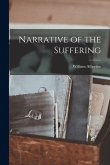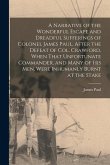"Narrative of the Suffering and Defeat of the North-Western Army, Under General Winchester," recounts a harrowing chapter in the War of 1812. William Atherton's firsthand account details the disastrous Battle of the River Raisin in Monroe, Michigan, and its devastating aftermath. This historical narrative plunges readers into the heart of the conflict, exposing the brutal realities faced by American soldiers. Atherton chronicles the tragic massacre of prisoners of war, offering a visceral portrayal of the violence and desperation that defined this pivotal battle. The book further documents the sixteen months of imprisonment endured by the author and others, held captive by Native Americans and British forces. A vital historical document illuminating the complexities of the War of 1812, this republication sheds light on the experiences of soldiers, the role of Native Americans, and the lasting impact of a brutal military defeat. A crucial primary source for understanding 19th-century American military history. This work has been selected by scholars as being culturally important, and is part of the knowledge base of civilization as we know it. This work is in the public domain in the United States of America, and possibly other nations. Within the United States, you may freely copy and distribute this work, as no entity (individual or corporate) has a copyright on the body of the work. Scholars believe, and we concur, that this work is important enough to be preserved, reproduced, and made generally available to the public. We appreciate your support of the preservation process, and thank you for being an important part of keeping this knowledge alive and relevant.
Bitte wählen Sie Ihr Anliegen aus.
Rechnungen
Retourenschein anfordern
Bestellstatus
Storno



![Narrative of the Suffering & Defeat of the North-Western Army Under General Winchester [microform]: Massacre of the Prisoners, Sixteen Months Imprison Narrative of the Suffering & Defeat of the North-Western Army Under General Winchester [microform]: Massacre of the Prisoners, Sixteen Months Imprison](https://bilder.buecher.de/produkte/65/65588/65588625m.jpg)





